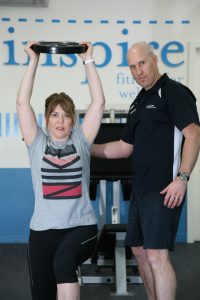“I don’t want to lift weights because it will make me look big and bulky”
The above statement is a misconception shared by both male and female gym goers, although it’s a more common belief held among female exercise goers. Regular strength training is important for leading a healthy lifestyle, weight management and for the prevention of many chronic diseases.
Resistance Training
There is a difference between resistance training for function and weight training specifically for muscle mass. The aims of resistance training for function are geared towards gaining adequate levels of strength, endurance, and mobility to provide for successful participation in occupational effort, recreational pursuits, familial obligation, thus improving quality of life. This differs considerably to training in the pursuit of gaining large amounts of muscle mass which is the goal in the sport of body building.
Nutrition
To gain muscle mass a positive energy balance must be achieved, this is usually achieved by adding calories to the diet – adding anywhere between 500-1500 a day to a normal diet can be considered the norm for gaining muscle. It must also be noted that these are not the fun type of calories like jam sandwiches and muffins – think more along the lines of chicken and spinach! Consuming large amounts of protein is also required and levels of 1.5-2 grams per Kg (of bodyweight) are essential. Basically it’s going to take a big nutrition push, timing of meals and eating more frequently to achieve muscle mass.
Hormones
Physiologically men and women are quite different, these differences stem from contrasting hormones. Hormones are highly intricate and play a large role in our physiology and behaviour. Testosterone is an anabolic hormone and is responsible for the promotion of tissue growth and is very important in the development of muscle mass. Testosterone is up to 20 times lower in females compared to males; this is a major reason why females find it much harder to build muscle.
Muscle
Recent studies have indicated differences between males and females in muscle fibre type & makeup. These differences make it harder for women to initially gain and sustain increases in muscle mass. On average – men and women each year after the age of 40 lose 250grams of lean muscle tissue. Loss of muscle mass (sarcopenia) has a multitude of negative health consequences; as well as a continual reduction in capacity for daily movements and activity.
In summary, it is important for the health of all women to take part in regular resistance training, and this training should aim to increase muscle to normal and appropriate levels. Resistance training does NOT equal big and bulky muscles – unless you are pursuing a body building regiment. Women training for muscle mass get other benefits – for example decrease the risk of osteoporosis, fat loss and decrease coronary disease risk.

Written by: Jack Hoffman AEP (Accredited Exercise Physiologist)
